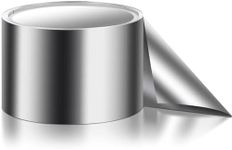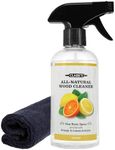We Use CookiesWe use cookies to enhance the security, performance,
functionality and for analytical and promotional activities. By continuing to browse this site you
are agreeing to our privacy policy
Best Moss Killer For Roofs
From leading brands and best sellers available on the web.#2

RotoMetals
5%OFF
Zinc Armor - 3 Wide Zinc Strip, 1-roll of 50 Feet Prevent Algae, Moss,for Roofs Fungus & Mildew by Roto Metals
View Product
#3

Wet and Forget
17%OFF
Wet & Forget Moss, Mold, Mildew, Algae Stain Remover 0.75 gal Concentrate (makes 4.5 gallons)
View Product
#4

Therwen
Therwen Zinc Metal Strip for Roof and Garden 2.5 Inch x 49.21 Feet Roof Strip High Purity Zinc Strips for Moss Mildew Prevention Home Moss Killer for Garden Prevents Roofing Stains
View Product
Buying Guide for the Best Moss Killer For Roofs
Choosing the right moss killer for your roof is important to ensure effective removal of moss without damaging your roofing material or harming the surrounding environment. The best product for you will depend on your roof type, the extent of moss growth, and your preferences regarding application and safety. Understanding the key specifications will help you make an informed decision and achieve long-lasting results.Active IngredientThe active ingredient is the main chemical or natural compound that kills moss. Common options include zinc sulfate, potassium salts of fatty acids, and bleach-based formulas. This is important because some ingredients are more effective or safer for certain roof materials and environments. For example, zinc and copper-based products are long-lasting but may be harmful to plants, while soap-based or natural options are safer but may require more frequent application. If you have pets, children, or a garden near your roof, consider a less toxic formula. For heavy moss infestations, a stronger chemical may be necessary.
Application MethodApplication method refers to how the moss killer is applied to your roof, such as liquid sprays, granules, or ready-to-use hose attachments. This matters because some methods are easier and safer to use, especially on steep or hard-to-reach roofs. Sprays are good for even coverage and quick results, while granules can be spread and left to work over time, especially in rainy climates. If you prefer a hands-off approach, choose a product that can be applied from the ground or with minimal effort. For targeted treatment, a spray may be best.
Roof Material CompatibilityRoof material compatibility means whether the moss killer is safe to use on your specific type of roof, such as asphalt shingles, tiles, metal, or wood. This is crucial because some chemicals can stain, corrode, or weaken certain materials. Always check the label or product description to ensure it is suitable for your roof type. If you are unsure, opt for a product labeled as safe for all roofs or consult a professional.
Environmental ImpactEnvironmental impact refers to how the moss killer affects plants, animals, and water sources around your home. Some products can be toxic to lawns, gardens, or aquatic life if they run off the roof. If you are concerned about the environment, look for biodegradable or eco-friendly formulas. If your roof drains into a garden or pond, this should be a top consideration.
Residual EffectResidual effect describes how long the moss killer continues to prevent moss from returning after application. Some products offer long-term protection by leaving a residue that inhibits new growth, while others only kill existing moss. If you want to minimize maintenance, choose a product with a longer residual effect. If you prefer to avoid chemicals lingering on your roof, a quick-acting, non-residual product may be better.
Ease of UseEase of use covers how simple and safe the product is to apply, including whether it requires mixing, special equipment, or protective gear. This is important for your safety and convenience. If you are not comfortable working on a roof or handling chemicals, look for ready-to-use products or those that can be applied from the ground. If you are experienced and want more control, a concentrate that you mix yourself may be suitable.






